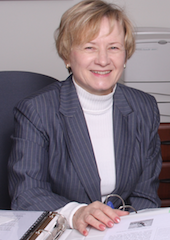SC CTSI Program Director Frances Richmond To Lead New International Center For Regulatory Science
Helping assure that promising new medical products reach the marketplace faster while also maintaining proper safety standards.
Frances Richmond, PhD, director of the SC CTSI Regulatory Knowledge and Support Program, was recently appointed as director of the new International Center for Regulatory Science at USC to help assure that promising new medical products reach the marketplace faster while also maintaining proper safety standards.

The USC School of Pharmacy has established the International Center for Regulatory Science to help assure that promising new medical products reach the marketplace faster while also maintaining proper safety standards.
The new center’s research is aimed at meeting the challenges caused by increasingly complex regulations that result from rapid changes in technology and economic globalization.
“During my recent visit to universities in Asia, several academic leaders noted USC’s preeminent reputation in the study of health care management and regulatory policy, specifically the regulatory science program and the USC Schaeffer Center for Health Policy and Economics,” said USC provost and senior vice president for academic affairs Elizabeth Garrett. “The new International Center for Regulatory Science further solidifies USC’s commitment to transnational collaboration focused on the safety and effectiveness of medical products, practices and devices that enhance the well-being of our global community.”
Many pharmaceutical and medical device companies face cost constraints that have been tightened by the economic crisis. And agencies like the U.S. Food and Drug Administration (FDA) are threatened with budget cutbacks. Although the FDA collects fees from the pharmaceutical and medical device industries to review their products for approval, it also receives federal funding.
Cutbacks to the FDA might have the perverse effect of worsening the agency’s response time for reviewing much-needed products.
“The center’s main goal is to help ensure medical products are made faster, safer and better,” explained Frances Richmond, the center’s director and USC School of Pharmacy professor. “We’re concerned with the successful transition from laboratory discoveries to the ultimate outcome of a patient’s treatment.”
Richmond and her collaborative team at USC believe the center’s mission is vital and the timing for its launch critical. The center will work with companies to understand and improve best practices to help their FDA submissions proceed more quickly. The center also will facilitate communication between industry and government regulators.
“We’ll work to understand the problems facing both sides – the regulator and the industry – that could become bottlenecks to product development,” Richmond said.
Since the marketplace is now global, the center will work with the FDA and U.S. companies, as well as their counterparts around the world in increasing speed while ensuring safety for medical product marketplace
Memoranda of understanding with programs in China and Korea, as well as visiting scholar opportunities, complement exchange programs for students who are pursuing education in regulatory, quality and clinical sciences.
“The center promises to be a proactive voice impacting how pharmaceutical and medical device products are brought to market,” said USC School of Pharmacy Dean R. Pete Vanderveen. “The university offers tremendous collaborative opportunities, including our own Leonard D. Schaeffer Center for Health Policy and Economics, that surely will work with Dr. Richmond and her group.”
The Schaeffer Center will house the school’s Quintiles Chair in Pharmaceutical Development and Regulatory Innovation, which has been made possible by a gift from Quintiles. A search for the holder of this chair has begun, and collaboration with the eventual chair and the International Center for Regulatory Science presents unique opportunities for research.
The center will build upon the school’s long-standing leadership in regulatory science education. The school established the world’s first doctorate in regulatory science and has a history of innovative educational programs, including a master’s degree and several certificate programs.
- See more at: http://news.usc.edu/#!/article/29161/Pharmacy-Establishes-International-Center-for-Regulatory-Science
The original article was published on USC.edu



